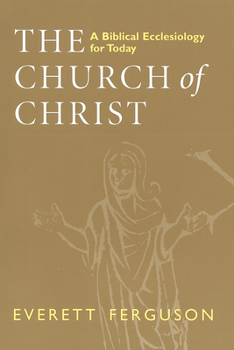Church of Christ: A Biblical Ecclesiology for Today
Select Format
Select Condition 
Book Overview
The Church of Christ develops the affirmation that Christ is not complete without his people. It grounds ecclesiology in Christology and soteriology. Beginning with the Old Testament basis of the New Testament teaching about the church, the book gives a consistent correlation of Christ with the church's nature, membership, assemblies, ministry, and life. This is not a historical study but a doctrinal study. The aim is to present a biblical theology of the church. A doctrinal approach, however, does not mean a doctrinal scheme is imposed on the text; rather, the effort is to let the doctrinal teaching arise out of the text itself. The systematic treatment of the topics traditionally covered in studies of the doctrine of the church are here brought together in relationship to Christ, who is seen as providing the nature of the church and of its membership and as providing not only the example for the church but also a living continuation of himself in its worship, polity, and ethics. The "Today" in the subtitle does not imply a tailoring of biblical ecclesiology to the interests of the present, but is meant to emphasize that biblical ecclesiology is viable today; it is also an acknowledgment that the questions addressed are in part shaped by contemporary as well as historical issues in ecclesiology. In light of these considerations, Ferguson unveils a comprehensive model of the church that is both biblically centered and relevant to today's world.
Format:Paperback
Language:English
ISBN:0802841899
ISBN13:9780802841896
Release Date:August 1997
Publisher:William B. Eerdmans Publishing Company
Length:463 Pages
Weight:1.15 lbs.
Dimensions:1.0" x 6.1" x 9.0"
Related Subjects
Christian Books & Bibles Religion Religion & Spirituality Religious Studies TheologyCustomer Reviews
2 ratings
Christ is Lord
Published by Thriftbooks.com User , 14 years ago
This is a very useful and thorough text book. I would recommend it for anyone who wants an in depth study of the Lord's church.
Ecclesiological Milestone
Published by Thriftbooks.com User , 24 years ago
With the publication of Everett Ferguson's book on ecclesiology, another milestone has been reached in the scholarly presentation of the distinctive theological perspective of Churches of Christ. The book is divided into six chapters, each roughly sixty to seventy pages in length. Within each chapter, Ferguson neatly and systematically outlines his thoughts and arguments. The first chapter, entitled "The People and the Messiah: History and Eschatology," deals mainly with background issues. It examines the Old Testament teaching on the importance of covenant and the meaning of the phrase "kingdom of God" in its relationship to an and distinction from the church. Ferguson enters into the New Testament and ecclesiology proper via a consideration of Jesus as Messiah, including a careful exegesis of Matt. 16:13-23, where he concludes that the "rock" of Matt. 16:18 is not Peter, but the fact of Jesus' Messiahship. Ferguson's analysis of Matt. 16:13-23 is insightful and carefully articulated. Within this section, he gives attention to "the gates of Hades will not prevail" and concludes with some interesting yet encouraging insight. In the second chapter, "The Church and Her Lord: The Nature of the Church," Ferguson deals with and focuses on three images, "people of God," "body of Christ," and "community of the Spirit." A peculiar feature in this chapter is placing the discussion of the word ekklesia last rather than first. The latter would seem more appropriate and would seem to set the stage for the chapter, especially for a work of biblical ecclesiology. This great section will open the eyes of the reader and renew his focus of church. That is to say, this chapter correctly puts Christ as the head of the church and gives Him His appropriate place. The third chapter concentrates on, "The Church and Her Savior: Salvation and Church Membership." Essentially this section covers soteriology, which determines ecclesiology, but it is not ecclesiology itself. His full treatment of the nature of sin, the meaning of the cross, and the human response to God's saving work is only loosely linked to his topic of ecclesiology. This is not to say that this section is uninteresting or uninformative because it is quite helpful for a fuller understanding of these matters. Far more important is the content of Ferguson's soteriology. Ferguson is strong when it comes to the necessity of baptism. A few statements will give the reader an idea of his position: "Baptism is the time at which one is incorporated into Christ and so becomes a child of God" (pg. 170); "Baptism is a `calling on the name' of the Lord" (pg. 180); and, "Baptism is the appointed time at which God pronounces forgiveness" (pg. 183). He concludes: There must be an objective necessity about baptism, or New Testament writers could not speak of baptism in the way they do" (pg. 185). How refreshing! In our world of relativity and ecumenism, p






